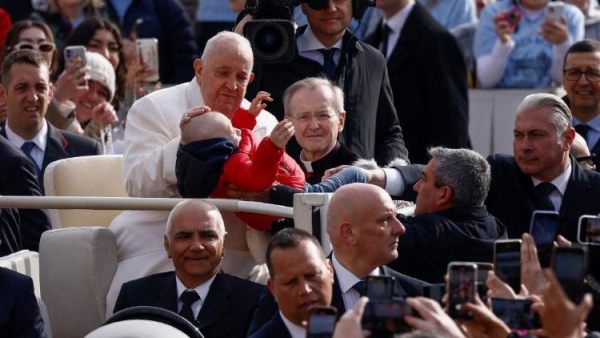Pope at Audience: We can acquire virtue through God's grace
 During his Wednesday General Audience, Pope Francis continues his catechetical series on virtues and vices, this week turning to virtue in general and encouraging the faithful to acquire it through the Lord's grace.
During his Wednesday General Audience, Pope Francis continues his catechetical series on virtues and vices, this week turning to virtue in general and encouraging the faithful to acquire it through the Lord's grace.
"May we all rediscover and practise virtue," Pope Francis urged during his weekly General Audience on Wednesday morning in the Vatican.
At the start of Audience, the Holy Father explained he would have a collaborator, Father Pierluigi Giroli from the Vatican Secretariat of State, read for him, since he still has "a bit of a cold."
This week, the Pope continued his catechetical series on vices and virtues. After concluding his cycle focusing on several sins, this week he transitioned to virtue.
Rediscovering, practicing virtue
The human heart, the Pope acknowledged, "can indulge evil passions" and "pay heed to harmful temptations disguised in persuasive garb," but, he reminded, "can also oppose all of this."
The human being, the Holy Father encouraged, is made for goodness, stressing "this truly fulfils him," which enables one to live out this art.
Being aware of our innate inclination for what is good, he suggested, enables us to possess certain permanent dispositions.
"In these dramatic times of ours in which we often have to come to terms with the worst of humanity," Pope Francis said, virtue "should be rediscovered and practised by all."
"In a distorted world, we must remember the form in which we were shaped," the Pope said, namely in "the image of God, that is forever imprinted upon us."
Defining virtue
"But how can we define the concept of virtue?" the Holy Father pondered.
The Pope recalled that the Catechism of the Catholic Church offers us a precise and concise definition of virtue as a "habitual and firm disposition to do the good” (no. 1803).
Therefore, he noted, it is not some "improvised" or "somewhat random good that falls from heaven sporadically."
While acknowledging that even criminals have performed good deeds, that "are inscribed in the “book of God,” the Holy Father said, "virtue is something else."
"It is," he clarified, "a goodness that stems from a slow maturation of the person, to the point of becoming an inner characteristic."
Calling virtue "a habitus of freedom," the Pope argued that "if we are free in every act," and we have the tendency to choose toward the good, this is virtue.
How to acquire virtue
The Pope recognized that understanding how to acquire virtue is "not simple," but "complex."
"For the Christian, the first aid," he insisted, "is God’s grace." Indeed, he stressed, the Holy Spirit acts in us who have been baptized, working in our soul to lead it to a virtuous life.
"How many Christians," he marveled, "have reached holiness through tears, finding they could not overcome some of their weaknesses! But they experienced that God completed that work of good that, for them, was only a sketch."
Grace, he said, always precedes our moral commitment.
"Moreover," Pope Francis continued, "we must never forget the very rich lesson from the wisdom of the ancients, which tells us that virtue grows and can be cultivated. And for this to happen, the first gift to ask of the Spirit is precisely wisdom."
Good will and open-mindedness
The human being, the Pope noted, is not "a free territory for the conquest of pleasures, emotions, instincts, passions," that does not have the ability "to do anything against these forces, at times chaotic, that dwell within."
In this context, he stressed, everyone can exercise open-mindedness, a type of "wisdom" that "can learn from mistakes in order to direct life well," as well as use their good will, "which enables one to choose the good."
Pope Francis concluded by encouraging faithful to embrace our journey through the virtues, in a "serene universe that is challenging," "but decisive for our happiness."
Deborah Castellano Lubov
Source: vaticannews.va/en

